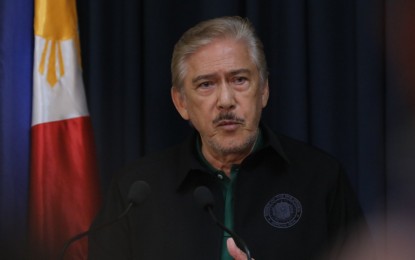MANILA – Senate President Vicente Sotto III proposed expanding the powers and transparency mechanisms of the Independent People’s Commission (IPC) under Senate Bill 1215.
During the Committee on Justice and Human Rights hearing, Sotto said the bill, originally titled the Infrastructure Anomalies Investigation Act of 2025, needs to include stronger provisions to make the IPC fully accountable, transparent, and empowered to act against corruption across government sectors, not only in infrastructure.
“Because of the swift filing that I wanted to do for Senate Bill 1215 or Creating the Independent People’s Commission, I did not realize that there are other necessities that should be included in the bill,” he said, as he moved to submit several amendments for consideration.
He proposed that IPC hearings be made accessible to the public, citing the need for transparency and public confidence.
He also called for penalties for private individuals involved in corruption, not just public officials, by strengthening Section 4 of Executive Order 94, series of 2025, which created the Independent Commission for Infrastructure (ICI).
Sotto further recommended granting the IPC the authority to file cases before appropriate courts or agencies, to endorse witnesses for protection, and to request the freezing of assets and preventive suspension of government officials under investigation.
He added that the commission should also be able to recommend hold departure orders for personalities facing a probe.
“This Independent People’s Commission that we would like to push for is not limited to infrastructure. It is encompassing. It will include everything that would need investigation of the people and different sectors of the government,” Sotto said.
Senator Francis Pangilinan, chair of the committee, said in his opening statement that the measure seeks to institutionalize a permanent, non-partisan anti-corruption body with fiscal autonomy and statutory authority to probe anomalies in all government infrastructure projects.
He said the IPC’s jurisdiction would cover both national and local projects, with investigations to be completed within 60 days, and findings to be made public within 30 days.
Senate Bill 1215
“Senate Bill 1215” is not a place or cultural site, but a piece of proposed legislation. As such, it does not have a physical location or a history in the traditional sense. Its “history” would be its legislative journey, including its introduction, any committee hearings, and whether it was passed into law.
Independent People’s Commission
I am unable to provide a summary for the “Independent People’s Commission” as it does not appear to be a widely recognized historical place, landmark, or cultural site. The term is more commonly used to describe a temporary investigative or advisory body formed to address a specific issue, rather than a permanent physical location. Without a specific, known commission in mind, I cannot provide a meaningful historical summary.
Committee on Justice and Human Rights
The Committee on Justice and Human Rights is a parliamentary body, typically within a national legislature like the European Parliament, responsible for overseeing legislation and policies related to justice, civil liberties, and fundamental rights. Its history is tied to the growing emphasis on human rights protection in the late 20th and 21st centuries, where such committees were established to ensure that laws comply with constitutional and international human rights standards. It plays a key role in scrutinizing the government’s actions and proposing laws in these critical areas.
Infrastructure Anomalies Investigation Act of 2025
The “Infrastructure Anomalies Investigation Act of 2025” is not a physical place or cultural site, but a proposed piece of US legislation. If enacted, this act would establish a formal government framework to investigate and address unusual or unexplained structural or systemic flaws within national infrastructure. Its history is prospective, as it is a forward-looking bill designed to proactively manage potential future infrastructure risks.
Executive Order 94
Executive Order 94 is not a place or cultural site, but a directive issued by U.S. President Harry S. Truman in 1947. It reorganized the structure of the U.S. military by renaming the “Department of War” to the “Department of the Army” and establishing it within the newly created National Military Establishment (later the Department of Defense). This order was a key part of the post-World War II restructuring of the American armed forces.
Independent Commission for Infrastructure
The Independent Commission for Infrastructure is not a specific historical or cultural site, but rather a type of public body. These commissions are typically government-established, independent organizations tasked with planning, overseeing, and advising on major national infrastructure projects like transport, energy, and digital networks. Their history is modern, emerging in many countries over recent decades to ensure that large-scale public investments are efficient, evidence-based, and non-partisan.
Senate President Vicente Sotto III
Senate President Vicente Sotto III is not a place or cultural site, but a prominent Filipino politician. He served as the Senate President of the Philippines from 2018 to 2022 and is known for authoring key legislation, including the Philippine AIDS Prevention and Control Act of 1998. His career has been a significant part of the country’s modern political history.
Senator Francis Pangilinan
Senator Francis Pangilinan is not a place or cultural site, but a prominent Filipino politician. He served as a Senator of the Philippines for multiple terms and was a key author of significant agricultural laws, such as the Fisheries Code. His political career has been focused on legislation concerning food security and rural development.






